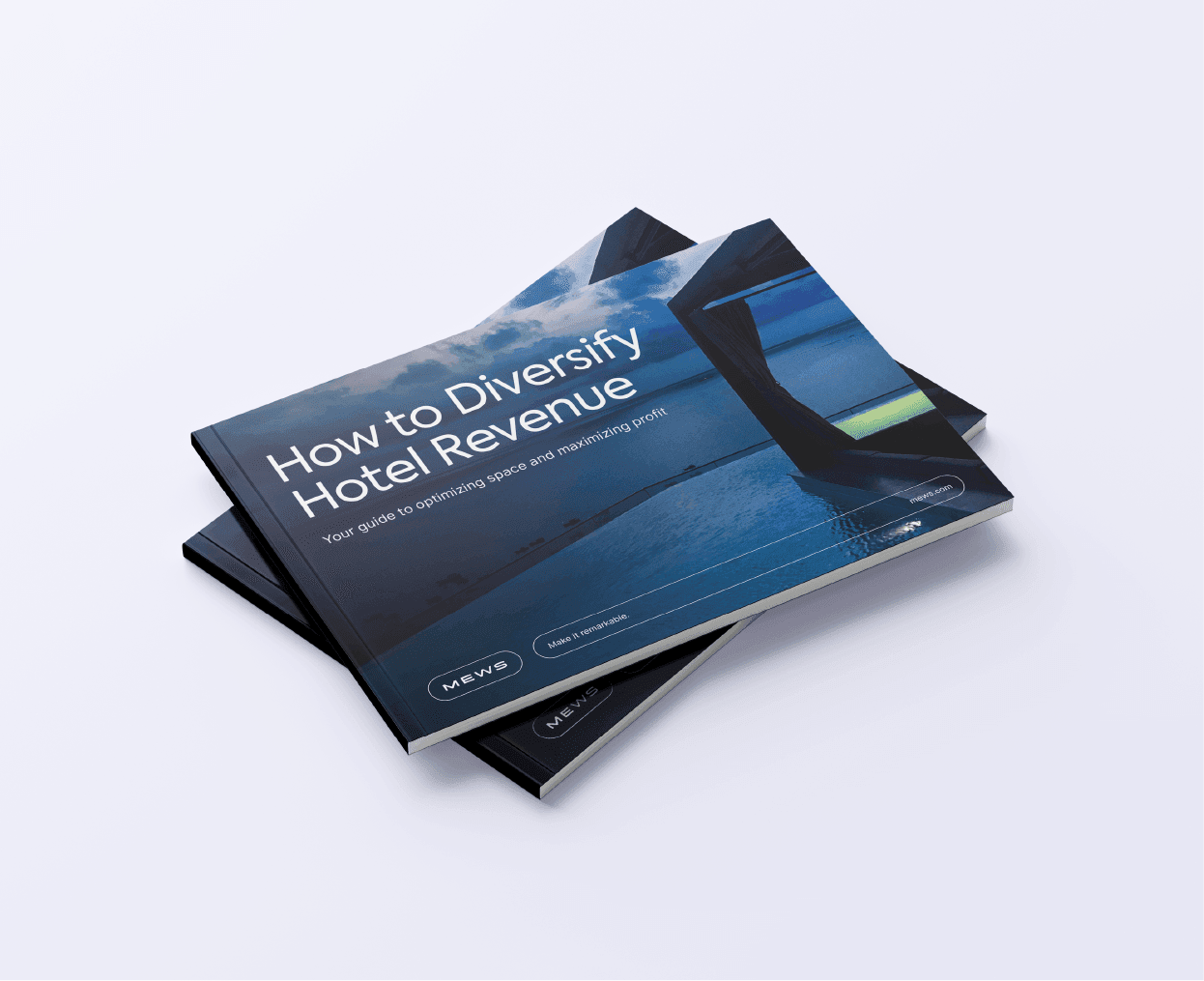Whether you're taking direct bookings orthird party reservations at your hotel, being clear on how you're going to generate those bookings is key. For future guests, it's also important to offer different ways to book so you can connect with them wherever they are online, increasing the chances they'll choose your hotel.
We'll explore direct bookings vs third party hotel bookings, including the advantages, the risks, and whether it's better to book directly or through a third party. Ultimately, understanding these different distribution strategies will help your hotel achieve optimal profitability.
What are direct bookings?
Direct bookings occur when a guest books directly through your hotel's website, social media channels, or any other direct channels you have set up, such as by calling directly or through a customer service center. This usually involves having a booking engine on your website, like the Mews Booking Engine.
By booking directly, guests can bypass intermediaries, securing better rates, a more personalized experience, and the possibility of capitalizing on special deals. Plus, special requests, room preferences, and added services are easier to access and purchase when guests deal directly with the hotel.

Advantages of booking a hotel directly
There are many advantages to booking a hotel directly.
Take care of the guest journey from start to finish
When guests book directly, hotels can manage the entire guest journey, ensuring a seamless experience from start to finish. They can create personalized communications, such as confirmation and pre-arrival emails, to boost guest engagement and prepare them for their stay. This helps create a unique experience with guests at the center.
After guests check out, hotels can send satisfaction surveys to gather feedback and identify areas for improvement. This also allows hotels to better manage guest loyalty by having a clear path to achieving it.
Personalized service
When guests book directly, they can often enjoy a more personalized experience. This is because hotels can better accommodate special requests and tailor the hotel room to meet the guest's exact preferences.
Loyalty
When guests book directly, it's also easier for hotels to encourage guests to become loyal customers through offering the likes of loyalty points, special rewards or discounts that will incentivize repeat stays.
Reduced fees
For hotels, direct bookings are the most profit-generating of the two booking types because there is no commission to pay to third parties. While they still need to consider acquisition and marketing costs, they can offer better prices to guests and improve their profit margins.
Potential for upselling
Hotels can more easily promote additional services when guests book directly, as upselling can be integrated into the reservation process. Whether it's booking a spa treatment, offering dining options, or room upgrades, direct contact with guests enhances the potential for upselling before they arrive.

What are third party bookings?
Third party hotel bookings are reservations made through intermediaries such as OTAs (online travel agencies). These platforms act as a bridge between hotels and guests, allowing hotels to offer their services and guests to book conveniently.
Some examples of third-party booking platforms include OTAs like Booking.com, Expedia, and Hotels.com. There are also metasearch engines like TripAdvisor, Kayak, and Google Hotels, which aggregate hotel prices from various sources. Additionally, traditional travel agents can book on behalf of customers.
Advantages of using third party bookings
Booking through a third party can offer several advantages for both hotels and guests, such as convenience, the ability to price shop, and leveraging extensive marketing budgets.
Take advantage of marketing budgets
OTAs and metasearch engines often have larger marketing budgets and greater online visibility. By listing on these platforms, hotels can enhance their distribution efforts. While hotels need to invest in marketing regardless, partnering with these platforms can amplify their reach.
Convenience
These platforms make it easy for guests to search, compare, and book hotels while accessing user reviews. This means guests don't have to visit multiple websites to find the best prices.
Compare prices
Guests can easily compare prices, amenities, and reviews across channels in one place, saving time and helping them find the best deal based on their preferences.
What are the risks of booking hotels through a third party?
While booking through a third party certainly has its benefits, it's important to consider the following risks. By choosing a reliable platform and reading reviews carefully, guests can mitigate these risks.
Making changes
Guests may have less flexibility when it comes to making changes or cancellations through third parties. Modifying bookings can be more complicated and may involve fees. Guests must coordinate with the booking platform rather than directly with the hotel, which can be less flexible. Hotels are often able to offer more flexibility because they can evaluate changes on a case-by-case basis.
Errors in bookings or miscommunication
Third-party bookings can sometimes lead to overbookings or errors if there are issues with the hotel's channel manager or if booking details are not accurately conveyed. This can result in overbookings or miscommunication regarding special requests, room preferences, or payment status.
Missing the human edge
When guests book directly, hotels can provide more personalized customer service and address any questions or concerns that may help secure a booking. With third parties, customer service is often limited and may not be as helpful. Handling issues like incorrect bookings, refunds, or cancellations can be more challenging with an intermediary involved.

Should you book directly or through a third party?
When it comes to booking, if guests want a more personalized experience, they should book directly. This way, they can take advantage of the human touch and get their questions answered quickly and easily. If guests decide to book with a third party, it's advisable to use reputable sites like Expedia, Booking.com, or Hotels.com.
Guests should also read all policies and fee structures carefully to avoid hidden fees or surprises. It's a good idea to confirm reservations and any special requests directly with the hotel.
Conclusion
We've explored direct bookings vs third party bookings, highlighting the advantages and some of the risks. Regardless of where guests choose to book, maintaining price parity is crucial. This means ensuring that prices are consistent whether guests book on your website or through a third party, to avoid price conflicts.
Ultimately, the best approach for a hotel is to offer both direct and third-party bookings in your distribution mix. This way, you can capitalize on the benefits of both booking methods.
Looking to diversify your hotel's revenue streams?
Download our guide "How to Diversify Hotel Revenue"

Written by

Eva Lacalle
Eva a plus d’une décennie d’expérience internationale dans le marketing, le marketing numérique, la communication et l’événementiel. Lorsqu’elle ne travaille pas, elle aime surfer, danser ou explorer le monde.









